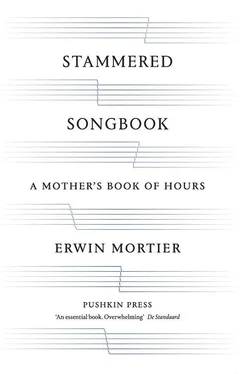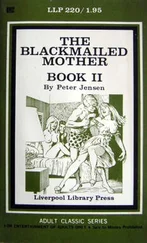She plants her nails in the flesh of my forearm until it almost bleeds when we take her out for a walk with us, and if she could she would huddle up in me while she stares in fearful incomprehension at the fields that have surrounded her since her earliest childhood.
In the mornings the restlessness strikes as soon my father has served her breakfast. He puts her in the car and drives off with her. Fleeing from emptiness at home, he tries to find warmth with us and especially with my sisters, which is not always convenient — but we drop what we are doing, if only for fifteen minutes or half an hour. We make coffee, give him a chance to calm down, although we know that shortly, at about four-thirty, she’ll want to be off again, and by about seven-thirty she’ll be in bed and the only sound that rings out will be that of the television.
You can’t say anything any more, nothing, he sighs. She doesn’t respond to anything. Nothing at all comes back.
The great sower of feelings of guilt is bringing in its rich harvest. We, feeling guilty because we can’t be there more often than we already are. He, feeling guilty when he has to give up any aspect of caring for her. Arranging for home care, bringing in a home help, and each time having the feeling you’re betraying him because he has the feeling he’s betraying her. We must try to get through this — I can’t imagine the havoc a disease like this must wreak in a family where they’ve never really got on, where all the dormant conflicts are exposed, in all their rawness.
At night she pulls up her legs in her sleep and then stretches them again. It drives him crazy.
Perhaps you shouldn’t sleep together any more, I say.
He shrugs his shoulders: I’ve tried the sofa in the living room a few times.
After a week or so that habit subsides, but her sleep becomes longer and deeper.
When will she not wake up again?

Sometimes I catch myself looking around me and wondering about those in my immediate circle: if you were to die, how great would the pain be? As if something like that can be assessed. Still, I try, as it were, to measure the depth of the knife wounds and tend to weigh the value of friendships and affections against a non-existent loss. Sometimes I sit reading on the sofa and see Lieven’s face on the cushion beside me — and I have to fight back the tears. Sometimes I’m with friends and I think: don’t go yet, don’t fall apart too soon.
Is that how it will be from now on? Is that the hush of older relations, as I remember them from parties in the past, when I found them nothing but a heap of gout and crutches in the shadow of the pines, surveying the youngsters around them, drinking, cooing and filled with reflection? I mean the awareness that behind your back the chilly wall of the eternal ice age is sliding closer, pushing mountains of rubble ahead of it, and that nothing can be done about it.
Mourning: someone throws a clammy floorcloth over the sun. Someone draws tiny lines in your chest with a razor blade. And on a godforsaken street corner, for the first time in years, you bump into your own pale self. The shadow leers: reunited at last.

She has become a mirror. If we look cheerful, she is too — more or less. If the worries and grief are written on our faces, she too is overcome by sadness. But recently, recently she is increasingly stuck in what seems to be a permanent state of disruption. I can only hope that there is very little awareness of time left, that there is no sense in her that it used to be different, better. That thought is never able to console for long. Having to live in an eternal now of fear is perhaps just as great a torture — nothing but present, nothing but panic.
Sometimes, when she fixes me with her look, I think that some mechanism in her brain scans for all signs of emotion, in my face, in my whole body. If I act more cheerful than I feel, I can’t calm her down. Somewhere in her brain, some circuit or other picks up the fact that I am behaving differently than my mood dictates. Perhaps an instinct that is more or less intact and possibly comes more to the fore now that the complex functions of thinking and speaking have virtually collapsed.

Whenever I wake her, he says, when I wake her, because I have to wake her, otherwise she may go on sleeping, she always laughs, happy as a child.
Surely it must be, he says, that she still remembers me?

She’s in hospital. While they were having breakfast, my father noticed that she suddenly went as white as a sheet. Her eyes rolled, her arms and legs started jerking. He lifted her up, her bony body that had become as light as a feather, laid her on the sofa and called the doctor. He rang us, but kept getting the voicemail. When I listened to the message I heard the panic in his voice: Mum’s had a kind of turn.
I rang him at once, and he had already calmed down somewhat, but his voice broke when he said: I thought I’d lost her.
So straight onto the train, to the most depressing provincial town imaginable, and the weather isn’t particularly helpful today. The doctors haven’t found anything, it may be connected with the medication, the mild sedative that she has to take in the evening, to which she is reacting badly. Very probably they will adjust the dose or try something else. It’s not exactly cheerful having to spend a day in a geriatric unit and I’d rather not imagine what it’s like to spend your last few days there. Whenever I have to go there I am overcome with rage and terror. This is the hidden monoculture of our welfare state, I think. Fields and fields of grizzled heads, sagging, half-depressed (lonely, probably) or anxious (also lonely, perhaps), and crammed with pills for want of human companionship. I think I’d rather string myself up if it ever gets to this point. As a neighbour of ours in this street did a few years ago, next door, on the landing from one of the rails of the banisters.
I’m almost certain that our grandmother, when she was forced to go into a home after that heavy fall on her bike, reached the conclusion privately that enough was enough. When she arrived and saw the building, which looks like a hospital, which smells like a hospital, which constantly screams in your face from the neon light fittings on the ceiling and the white material worn by the nursing staff that old age is a disease — she probably decided: that’s enough for me.
I’d bet my boots that when, in addition to the fractures she had sustained, she caught some mysterious intestinal infection, she gave nature a helping hand and said to her God, for whom in those last few months she said the rosary day in, day out: my husband dead. My oldest daughter dead. And now watching another of my children die. Out of the question. It’s my turn now. After which she started eating less and less.
I fumed, not to say boiled with rage at the crassness of that nurse who, with her hand in that of a fully conscious dying woman, was moved to say: it won’t be much longer. When I did her toilet this morning there was already post-mortem lividity on her back.
She died on the morning of Ascension Day. Beyond the open window the church tower shook out sackfuls of carillon music over the roofs and the zenith was brilliant blue. In my life the nineteenth century was over. She died a death from another age, surrounded by the few saints’ statues she had brought from home.
Читать дальше













